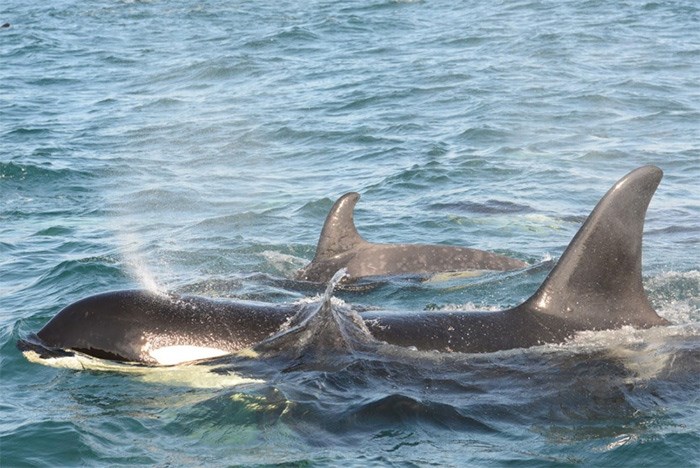 Springer the orca with her second calf: The population of southern resident orcas is already at a 30-year low, with just 78 in the Salish Sea. Photograph By Lisa Spaven, Department of Fisheries and Oceans
Springer the orca with her second calf: The population of southern resident orcas is already at a 30-year low, with just 78 in the Salish Sea. Photograph By Lisa Spaven, Department of Fisheries and Oceans
Southern resident killer whales are at risk of extinction if drastic measures are not taken to increase their food supply and reduce underwater noise caused by boats, a new study finds.
The population of orca that inhabit the Pacific coast of Canada and the U.S. are “balancing on a knife-edge” and under current conditions have a 25 per cent chance of being wiped out in the next 100 years, according to the peer-reviewed paper published Thursday in Scientific Reports.
“What this study does is it really shows the power of human actions to dictate the future of these whales,” said Misty MacDuffee, one of the authors of the report and a biologist with the Sidney-based Raincoast Conservation Foundation. “If we are able to reduce noise and increase chinook availability, we can change their trajectory from declining to increasing.”
The research, completed by an international team of scientists from Canada, the U.S. and the U.K., evaluated the threats to resident killer whales’ survival based on 40 years of data and simulated various combinations of these threats to predict future scenarios.
A major threat is the noise emitted from commercial and recreational boats, which can mask orcas’ communication calls, interfere with mating, change their behaviour and affect their ability to find Chinook salmon, MacDuffee said.
This could lead to lower birthrates and lower their chance of survival.
The population of southern resident orcas is already at a 30-year low, with just 78 in the Salish Sea, the series of waterways off the southern coast of B.C. and northern coast of Washington state that includes the Strait of Georgia, Juan de Fuca Strait and Puget Sound.
Noise can be mitigated if vessels slow down and avoid getting too close to southern resident killer whales, MacDuffee said.
On Thursday, federal Fisheries Minister Dominic LeBlanc announced regulations that will require boaters to stay at least 200 metres away from resident killer whales in Canadian waters. This brings Canada in line with the U.S., which already requires that boats give a whales a 200-yard berth.
MacDuffee said she’d like to see increased enforcement to make sure boaters are following the new rules and also encourages more regulations for the whale watching industry, to limit the number of vessels surrounding pods of southern residents and the number of operating days.
In the longer term, the technology used by the navy to make ships quiet could be adopted by commercial and recreational vessels, she said.
Another option is following a proposal in the U.S. to establish “no-go zones” for vessels in key feeding areas.
There are some areas along the shoreline in the Juan de Fuca strait where resident orcas could benefit from some free space to pursue salmon without the interference of boats, MacDuffee said.
Another threat to resident orcas’ long-term survival is a the lack of food. The study finds that a 30 per cent increase in chinook salmon is needed to recover the southern resident population, or 15 per cent if vessel noise is reduced by half.
However, the study warns that the threats are likely to worsen: Increased shipping will make the ocean noisier and the supply of chinook salmon is expected to decrease due to climate change.
The federal government’s decision to approve the Trans Mountain pipeline poses a significant threat to the southern resident orcas, MacDuffee said, because of noise from increased tanker traffic and the higher risk of oil spills.
“All of their actions will make the Salish sea a noisier place for whales to try to live in,” she said. “We have the ability to influence their future and it just requires the human action to give these whales a better place to live.”


